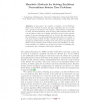Free Online Productivity Tools
i2Speak
i2Symbol
i2OCR
iTex2Img
iWeb2Print
iWeb2Shot
i2Type
iPdf2Split
iPdf2Merge
i2Bopomofo
i2Arabic
i2Style
i2Image
i2PDF
iLatex2Rtf
Sci2ools
121
click to vote
GECCO
2004
Springer
2004
Springer
Heuristic Methods for Solving Euclidean Non-uniform Steiner Tree Problems
In this paper, we consider a variation of the Euclidean Steiner Tree Problem in which the space underlying the set of nodes has a specified non-uniform cost structure. This problem is significant in many practical situations, such as laying cable networks, where the cost for laying a cable can be highly dependent on the location and the nature of the area through which it is to be laid. We empirically test the performance of a genetic-algorithm-based procedure on a variety of test cases of this problem. We also consider the impact on solutions of charging an additional fee per Steiner node. This can be important when Steiner nodes represent junctions that require the installation of additional hardware. In addition, we present novel ways of visualizing the performance and robustness of the genetic algorithm. The minimal spanning tree (MST) problem deals with connecting a given set of nodes in a graph in a minimal cost way. In a Steiner tree, we are allowed to use additional nodes if ...
| Added | 01 Jul 2010 |
| Updated | 01 Jul 2010 |
| Type | Conference |
| Year | 2004 |
| Where | GECCO |
| Authors | Ian Frommer, Bruce L. Golden, Guruprasad Pundoor |
Comments (0)

